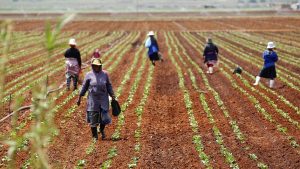Farming organisations attending the Nampo-Harvest Day Exhibition in Bothaville, Free State, are ambivalent about the new Agriculture, Agro-processing Masterplan. Minister Thoko Didiza is satisfied with the programme, but not all stakeholders are.
While AgriSA signed the document, TLU-SA did not. The plan seeks to ensure increased cooperation between the agricultural sector and the government.
The Agriculture, Agro-processing Masterplan seeks to transform the sector and address issues regarding infrastructure, food security and support for local farmers.
It also aims to assist more than 20 value chains to reach their full potential. Head of AgriSA, Christo van der Rheede, says the organisation was involved in drafting the document.
“Our role was to identify risk because there were radical plans that were put on the table, and we had to make sure those plans do not form part of the plan at the end of the day. But more so that the plan focused on issues that are important for food security like roads, infrastructure, the safety of farmers, expansion of markets and making sure farmers get the necessary support. Also taking care of farmers and supporting farmers who want to become part of the sector.”
Escalating food and fuel prices negatively impacting the agricultural sector in SA:
Van der Rheede says the priority now is to implement the Agriculture Agro-processing Masterplan and to ensure the objectives are not undermined. Government is an important stakeholder but lacks critical resources.
“Government to a large extent lacks competent people, and that’s why we as the people have an opportunity to take over that role to a large extent. We can never take over the government’s role, but we can play a big role to make sure the agenda remains clear and above board and ensures food security.”
However TLU-SA remains skeptical, General Manager, Bennie van Zyl, says the organisation’s concerns were never taken into consideration, despite submitting it at least eight times.
He says they are worried that the market is not taken into consideration.
“In 2005 we presented a plan on how can we help new entry farmers, to make sure we do it on a sound, principled basis, that is economically driven because at the end of the day the market principles is a decisive measure that will make sure who will be the farmer.
“If you make the success you will be there, otherwise, you will not be there. That is our concern – that that principle is not accommodated in this plan. So we are now concerned, because this is looking at an ideological plan, instead of an economic plan.” -Reporting by Marlinée Fouché






